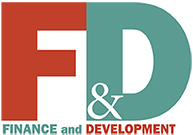How to Build a Better Future for Latin America
Finance & Development, March 2015, Vol. 52, No. 1
In the run-up to the 2015 IMF–World Bank Annual Meetings in Peru, the IMF hosted a contest for Latin American university students to write a short essay on “How to Build a Better Future for Latin America”—the issues and challenges that young people see facing future generations in the region and their possible solutions. Eight finalists were invited to the IMF’s 2014 Annual Meetings. The winner, Adriana Lorena Rojas Castro, is a 29-year-old Colombian who attends Universidad de ConcepciÓn, in Chile. Here is her essay.
Latin America and the Challenges It Faces

More than a geographic designation, Latin America and the Caribbean is a region characterized by multiple idiosyncrasies, which make it an attractive place vis-à-vis other continents. And yet despite our great cultural and environmental wealth we are far from being the envy of the world in terms of living standards.
Problems such as poverty, inequality, violence, environmental degradation, and drug trafficking are some of the factors that distinguish us as a region and that prevent us from growing. Yet these problems need to be addressed jointly and not separately, as we have been doing. It’s not that I think we have been doing badly; I simply believe that we have to attack these demons from another angle.
The first challenge with which the region must come to grips is inequality. I believe, for starters, that we have to improve the quality of education, not make it free as many students are demanding. We have to improve the conditions of teaching at all levels, and in higher education we must become proactive and equip students with better tools.
By improving education conditions we will improve competitiveness and productivity: we can become more innovative, and in that way we can achieve greater local development, thereby making it possible to reduce inequality and consequently tackle poverty. This is a virtuous circle—a process of participation by all of society, and one that will help consolidate the region’s place in this globalized world.
The next challenge for Latin America is violence, which we will have to attack from two sides. On the one hand, every country faces a problem of violence related to poverty and inequality. I said earlier that improving the quality of education was a first step, but we also need to generate more and better jobs—rather than subsidies, what we need is more working tools.
The last challenge, and one that is no less important, is environmental degradation. The way to go about this is not to ban the exploitation of resources but to generate awareness among big companies and to provide incentives so that production will be pursued in an environmentally more friendly manner.
The foregoing is what concerns me about Latin America, but my worry for my own future is that I will not have an active voice as a citizen to participate in seeking solutions to my country’s problems, and that the tools I am acquiring as a professional will not be adequate to cope with the competitive world we live in.
My generation and I will have to prepare ourselves more thoroughly to participate actively, whether in the private or public sector, and we will have to innovate not only through the development of policies but also through the production and provision of services so that, in both sectors, we can bring about the changes that will help the society in which we live. ■
Finalists
Daniela Amórtegui Martinez, 19, Colombian, Universidad del Rosario, Colombia
Luiz Guilherme de Brito Soares, 24, Brazilian, Universidade Católica de Pernambuco, Brazil
Gonzalo Huertas, 26, Argentine, Universidad de Buenos Aires, Argentina
Nabil Lopez Hawa, 24, Dominican, University of Michigan, United States
Mariana Montero Vega, 19, Costa Rican, Universidad de
Costa Rica
Mauricio Rada Orellanav, 19, Peruvian, Universidad del Pacifico, Peru
Monica Sodré Pires, 29, Brazilian, Universidade de São Paulo, Brazil


